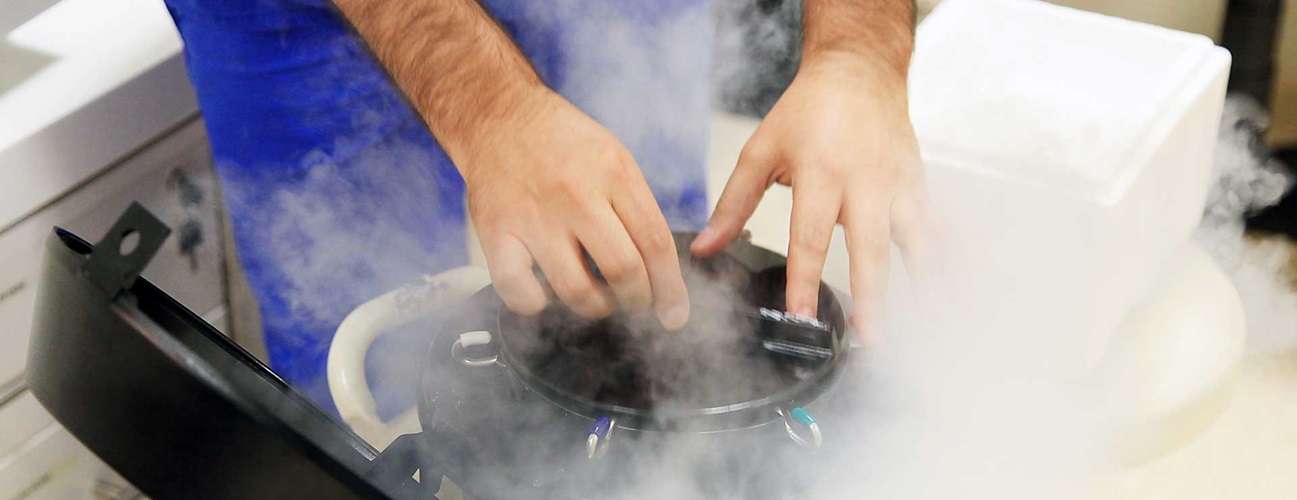Fertility and Cancer: What Are Your Options?
Featured Expert:
Cancer is a frightening diagnosis no matter what your age. It’s especially hard during the reproductive years, when you might find yourself wondering how treatment will affect your ability to have a child. Of course, the first — and most important — thing on your mind should be getting well. But since many cancer treatments can affect fertility, it’s important to plan ahead if you hope to become pregnant someday, says Johns Hopkins reproductive endocrinologist Mindy Christianson, M.D., who specializes in fertility preservation.
“A new cancer diagnosis is a very stressful event. A lot of women might not think about fertility right away, but then once reality sets in, it becomes a very important issue,” Christianson says.
She explains how to protect your fertility during this difficult time.
Three Types of Fertility Preservation
If pregnancy is in your future plans, let your oncologist know. He or she will likely refer you to a fertility specialist, who can assess your cancer treatment plan based on three factors: type of treatment, age and egg supply.
There are three common types of fertility preservation. How much time you have between diagnosis and treatment may determine which method is right for you. The options include:
- Embryo Cryopreservation. With this option, your eggs are fertilized and frozen as soon as possible after your diagnosis. This is done before you start treatment, so you might be able to become pregnant after completing cancer treatment. You’re treated with fertility drugs for about 10 to 14 days to help you develop multiple eggs. Next, the eggs are retrieved while you are under anesthesia. The eggs are fertilized with a partner’s or donor’s sperm, and then frozen. “This is the gold standard because a woman’s chance of live birth, depending on her age, could be 30 to 50 percent per frozen embryo,” Christianson says.
- Cryopreservation of Unfertilized Eggs. If you don’t have a partner, your doctor might recommend freezing eggs as soon as possible after your diagnosis, before you start treatment. With this option, you’ll get about 10 to 14 days’ worth of injectable medicine to stimulate your ovaries to produce multiple follicles. These are the cystlike structures where eggs develop. Then, during a 30-minute outpatient procedure, you’ll receive anesthesia while your eggs are surgically retrieved and frozen for future fertilization and implantation. There’s no “expiration date” on the eggs — they can be frozen indefinitely.
- Ovarian Cryopreservation. For certain types of cancer, such as some leukemias and lymphomas, chemotherapy often must start immediately. In this case, doctors can freeze ovarian tissue, which contains thousands of eggs. These eggs are not fully formed, but they are removed and developed in a lab for future use.
The third method is considered an experimental treatment — so far, about 80 women have had live births from ovarian cryopreservation — and Christianson warns that it can be risky for women with certain cancers. “It’s not an ideal type of fertility preservation for women who have blood cancers, since there could be seeding of cancer cells on the ovaries,” she explains. “But it’s the only option for women who don’t have a two-week window before treatment when they can harvest eggs. It’s also the only options for girls who haven’t started having periods yet.”
Risk Factors to Consider
When the ovaries are stimulated to retrieve eggs, estrogen levels often rise 10 to 20 times. Women with estrogen-sensitive cancers, such as breast or endometrial cancer, should also be treated with medications such as letrozole to keep estrogen levels in check, Christianson says.
Some cancer treatments, such as bone marrow transplants, pose the highest risks of lowering a woman’s egg supply. It’s often helpful to see a fertility specialist within six to 12 months after treatment, and be sure to clear any pregnancy plans with your oncologist. And remember, with proper planning, there’s plenty of hope.
“If you see a specialist, he or she can offer options to preserve your fertility to help you get pregnant sooner rather than later,” Christianson says.






